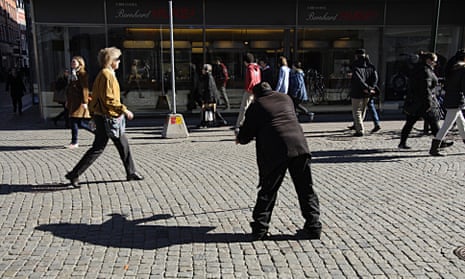A Swedish town has become the first in the country to introduce an official begging permit, requiring anyone who asks for money in the street to pay SEK 250 (£21) upfront for a licence.
Valid for three months, the permit can be obtained by filling in a form online or at a police station and requires a valid ID. Anyone found begging for money in Eskilstuna, west of Stockholm, without one faces a fine of up to SEK 4,000 (£342).
Jimmy Jansson, a Social Democrat local councillor, said the scheme, which came into force on 1 August after nearly a year of legal delays, was aimed at “bureaucratising” begging to “make it more difficult” for people to ask for money.
“We’ll see where this goes,” Jansson told local media, adding that the permit system should help bring homeless and other vulnerable people in contact with the local authority, in particular social services.
Critics of the scheme have said it legitimises begging and argued it makes those who are reduced to asking for money, many of whom are Roma from countries such as Romania and Bulgaria, more vulnerable.
Tomas Lindroos, of the Stadsmission charity, said the system increased opportunities for exploitation, pointing out that criminal gangs could pay for people’s permit applications and then demand extortionate repayments.
However, Jansson told Aftonbladet newspaper the council’s approach was the right one. “This is not about harassing vulnerable people but trying to address the bigger question: whether we think begging should be normalised within the Swedish welfare model,” he said.
“I hear a lot of criticism of any attempts to regulate begging, but I don’t see the same strength and energy directed at the fact that people are forced to beg in the first place.”
Several Swedish towns have outlawed begging altogether in recent months after the supreme administrative court upheld a ban on the practice in the town of Vellinge, in the country’s southernmost county of Skåne, in December.
The state broadcaster SVT reported that applications for eight permits had been filed in Eskilstuna over the weekend, while three EU citizens begging in the town centre without a licence were informed of the new law by police and moved on.
According to Aftonbladet, some beggars were attempting to circumvent the regime by selling blueberries, a development Jansson described as “not unexpected” and “a reasonable reaction to a change in the conditions”.
Thomas Bergqvist, Eskilstuna’s chief of police, told the paper the municipality’s lawyers were considering how to respond. “You have to look at the whole, make an assessment of whether this is a way of getting round the new provision,” he said.
